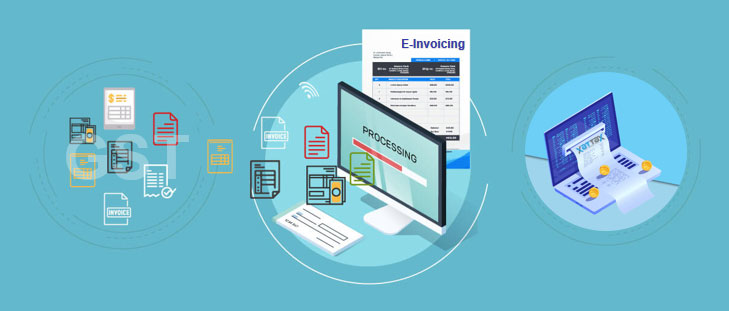14 Oct, 2020
Posted by jeenalogistics
e-invoicing
GST e-invoicing
E-Invoicing known as ‘electronic invoicing’ is a system in which all B2B invoices are electronically uploaded and authenticated by the designated portal of GST. After successful authentication, a unique Invoice Reference Number (IRN) is generated for each invoice by IRP (Invoice Registration Portal). Along with IRN, each invoice is digitally signed and added with QR code. This process is collectively called as e-invoicing under GST. The GST Council has made electronic invoicing or e-invoicing mandatory for companies having taxable turnover of Rs 500 Crore and above with effect from 1st October 2020.

Here are some key insights into e-invoicing for your consideration:
- IRN is applicable for all B2B, B2G Tax Invoices, SEZ billing, and Export Invoices/Debit notes/Credit notes.
- Not applicable for the Bill of Supply and Self invoicing under RCM and currently not applicable for B2C invoices.
- Without IRN, invoices will not be considered as valid invoices.
- Invoices once uploaded for IRN cannot be deleted or changed, the only option is to raise the credit note /debit note.
- All invoices should have correct GSTN, PIN Code, and State for the successful generation of IRN.
- E-invoices uploaded would be automatically shown for GSTR 1 Returns.
Let’s have a look at the benefits of e-invoicing:
- Real time tracking of Invoices
- Faster availability of Input credit
- Faster E-way bill generation – Part A of E-way bill auto updated from E-Invoices
- Reduction in fake invoicing and curbs on tax evasion
- Avoids Data entry problem of GSTR 1 return filing
- Cost savings to the extent of Printing Physical Invoices
Dos of e-invoicing
- Ensure Customer Master created with correct address, State and Pin code
- GST number should be updated correctly as per the GST Certificate given by customer. In case of doubts, please check the customer GSTN on the website http://www.gst.gov.in by putting the PAN or GSTN of customer
- If the customer is SEZ customer, follow the SEZ process while updating the GST number in the system
- Ensure all the invoices are generated as per the quote agreed with customer to avoid any credit note/debit notes
- Ensure all the above points are met before generating invoices in the system to have a smooth e-invoicing process
Don’ts of e-invoicing
- Do not enter wrong Customer address, State and Pin code in customer creation master
- Do not update GST number in the system without properly checking customer GST certificate and GST website
- Do not update wrong quotations in the system resulting in credit notes and debit notes
- Do not update SEZ customer GSTN under category Registered dealer instead of Registered SEZ unit
Consequences of non-compliance of e-invoicing provisions
- If an invoice is not registered on the IRP, it would not be treated as a valid tax invoice for all GST related matters, and consequently, would attract a penalty of Rs 10,000 for each instance of non-compliance.
- Without a valid tax invoice, transportation of goods may lead to detention of goods and vehicles, and imposition of penalty.
- In the absence of a valid tax invoice, customers may refuse to accept the goods and/or make payments as this would impact a recipient’s eligibility to avail ITC.
- Furthermore, the Government has plans to monitor the metamorphosis resulting in the restricted generation of e-way bill in the absence of IRN.
It is imperative that businesses make the requisite modifications in the e-invoicing process in order to avoid the consequences of non-compliance.



